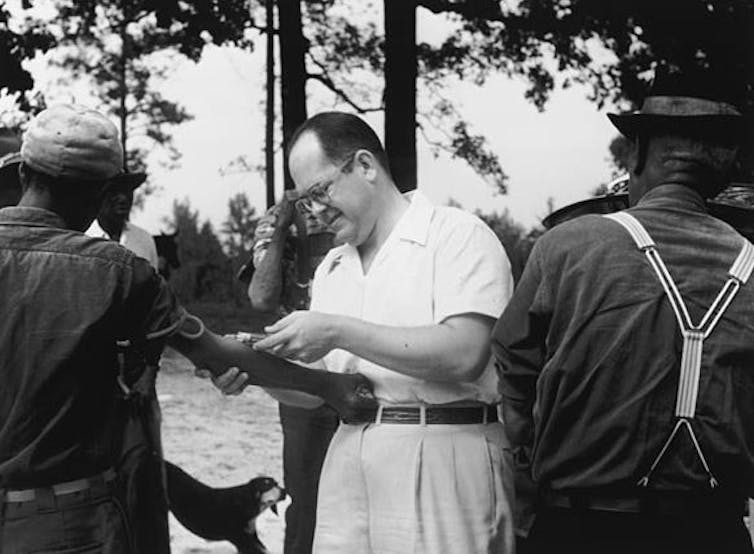News
Vaccine hesitancy is not new – history tells us we should listen, not condemn
Following the good news from three separate COVID-19 vaccine trials, optimism that life might be “back to normal by spring” is running high.
There are many reasons to temper this optimism as there is a lot we don’t know about the safety and long-term efficacy of these vaccines, as many have pointed out.
There are other concerns about vaccine take-up, as raised by news outlets and Twitter users, focusing on the 14% who would refuse a COVID vaccine outright and an additional 14% who would hesitate to take the vaccine. Coverage has been quick to conflate people who are “vaccine hesitant” with conspiracy theorists – drawing comparisons between those wary of the newly developed vaccines and the gullible fools or corrosive mythmakers who reject sound science.
We should be cautious about painting all those who are unsure about new medical technology and treatments with the same broad brush. This kind of scepticism has a long history, which should nudge us towards a more thoughtful and productive conversation about vaccines instead of the polarising vision of evil or stupid anti-vaxxers versus good, responsible citizens.
For one thing, not all hesitancy is the same. There is a spectrum that ranges from hardcore anti-vaxxers to those with reasonable concerns about safety or animal welfare. It is also worth pointing out that while anti-vaxx movements and individuals might be newsworthy, their influence on vaccination rates is often overstated and the support for COVID-19 vaccines is actually high (72%).
The lessons of history
More importantly, history tells us that widespread scepticism about vaccination is often a product of citizens’ relationship with the state. This is easy to see in the history of American healthcare, where state-sanctioned medical experiments often undermined the trust between 20th-century patients and their doctors. The infamous Tuskegee Syphilis Study, for example, ran for 40 years. It was 1972 before anyone thought to question whether intentionally withholding treatment from poor black patients with syphilis (even after antibiotic therapy became available) in order to study the “natural history” of the disease was a reasonable thing for a state to do to its citizens.

National Archives and Records Administration/Wikimedia Commons
The history of this kind of medical mistrust dates back to the origins of vaccination itself. In the late 19th century, when the English government tried to make smallpox vaccinations compulsory, they were met with protest. Vaccines had shoddy safety records in Victorian England and often came with debilitating and even deadly side-effects. But compulsory vaccination was also understood as a tool of an increasingly interventionist government that had fallen into the habit of using their legal powers to target various vulnerable groups of people, including sex workers and migrants.
Because vaccination was also closely linked to the Poor Law legislation that forced workers and their families into the brutalising regime of the workhouse, its new compulsory status seemed an attempt to extend this same punitive attention to the working classes.

Library of Congress/Wikimedia Commons
These protests were not the result of irrational conspiracy theories. Whatever good vaccination might have done in controlling the ravages of smallpox, which indeed ran wild through the crowded, inadequate dwellings of the labouring poor, fear that vaccination might lead to further marginalisation was strong and, given the context, reasonable. In choosing between disease or subjugation, the working poor of the Victorian era chose what they perceived to be – and might well have been – the lesser of two evils.
The past is not behind us
Though these events are now a part of history, they are not behind us. Their legacies are passed from generation to generation, sometimes explicitly in the collective memory of a population, and other times more quietly in the form of persistent disenfranchisement. Indeed, the discouraging COVID-19 incidence and mortality rates we have witnessed among minority ethnic groups point toward the same systemic racism that events like Tuskegee only more explicitly conveyed.
These seeds of distrust have been planted around the globe. The CIA’s campaign to find Osama bin Laden involved a fake hepatitis B vaccination project, that understandably eroded public trust in global health programmes in Pakistan.
Pharmaceutical companies habitually try out their wares on nations in the global south before marketing them to their richer, whiter neighbours in the north. That rumours fly as a result cannot be pinned on rabble-rousing conspiracy theorists. Hesitancy in these contexts is at the very least understandable. Simply put, there is a global shortage of trust. And trust is what we sorely need for vaccination uptake and success.
Given this, the more surprising fact may well be that the vast majority of people are willing to trust that their government will do right by its citizens. This tells us something encouraging about the faith people now have in medicine and scientific research. But this should not stop us from having important conversations about why some people might pause in the face of a new vaccine.
In the wake of this good vaccine news, it may seem a small matter that we relegate vaccine hesitators to the scrap heap of conspiracy theorists. But this rhetoric matters: it obscures the far more nuanced set of reasons people hesitate, and it prevents us from thinking carefully about why we trust and why others might not.![]()
Caitjan Gainty, Lecturer in the History of Science, Technology and Medicine, King’s College London and Agnes Arnold-Forster, Research Fellow, University of Bristol
This article is republished from The Conversation under a Creative Commons license. Read the original article.





















